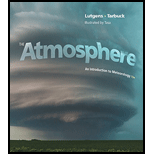
(a)
The
(a)
Answer to Problem 1GST
Water is most dense in a liquid state.
Explanation of Solution
Molecules of water present in ice are bonded together in a configuration characterized by many empty spaces. Hence, ice is less dense than water. The melting of ice causes the breaking of bonds. As a result, the molecules of water become more closely packed. The evaporation of liquid water causes the breakage of all hydrogen bonds, and hence free movement of water molecules occurs in a gaseous phase.
(b)
The state of matter in which water molecules are most energetic by referring to Figure 4.3.
(b)
Answer to Problem 1GST
Water molecules are most energetic in a gaseous state.
Explanation of Solution
Molecules of water present in ice are bonded together in a configuration characterized by many empty spaces. Hence, ice is less dense than water. Melting of ice causes breaking of bonds. As a result, the molecules of water become more closely packed. Evaporation of liquid water causes breakage of all hydrogen bonds, and hence free movement of water molecules occurs in a gaseous phase.
(c)
The state of matter in which water is compressible by referring to Figure 4.3.
(c)
Answer to Problem 1GST
Water molecules are compressible in a gaseous state.
Explanation of Solution
Molecules of water present in ice are bonded together in a configuration characterized by many empty spaces. Hence, ice is less dense than water. Melting of ice causes breaking of bonds. As a result, molecules of water become more closely packed. Evaporation of liquid water causes breakage of all hydrogen bonds, and hence free movement of water molecules occurs in a gaseous phase.
Want to see more full solutions like this?
Chapter 4 Solutions
Mastering Meteorology: Atmosphere, An Introduction to Meteorology